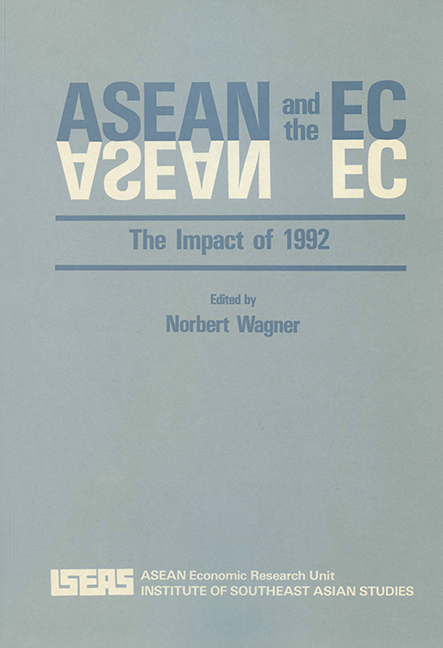Book contents
- Frontmatter
- Contents
- List of Tables
- List of Figures
- Acknowledgements
- PART I INTRODUCTION
- PART II COMPLETING THE EC INTERNAL MARKET
- PART III IMPLICATIONS FOR ASEAN
- V An Analysis of ASEAN-EC Trade in Textiles and Electronics, 1980–88
- VI The EC Internal Market and the ASEAN Electronics Industry
- VII The EC Internal Market and the ASEAN Textile and Clothing Industry
- VIII The Harmonization of Technical Standards and Regulations in the EC: Implications for ASEAN
- IX The EC Internal Market and ASEAN-EC Trade in Services
- X The EC Internal Market and ASEAN-EC Direct Investment Flows
- XI The European Currency System and ASEAN
- Contributors
VIII - The Harmonization of Technical Standards and Regulations in the EC: Implications for ASEAN
from PART III - IMPLICATIONS FOR ASEAN
Published online by Cambridge University Press: 09 November 2017
- Frontmatter
- Contents
- List of Tables
- List of Figures
- Acknowledgements
- PART I INTRODUCTION
- PART II COMPLETING THE EC INTERNAL MARKET
- PART III IMPLICATIONS FOR ASEAN
- V An Analysis of ASEAN-EC Trade in Textiles and Electronics, 1980–88
- VI The EC Internal Market and the ASEAN Electronics Industry
- VII The EC Internal Market and the ASEAN Textile and Clothing Industry
- VIII The Harmonization of Technical Standards and Regulations in the EC: Implications for ASEAN
- IX The EC Internal Market and ASEAN-EC Trade in Services
- X The EC Internal Market and ASEAN-EC Direct Investment Flows
- XI The European Currency System and ASEAN
- Contributors
Summary
Introduction
By the end of 1992, the twelve-nation European Community (EC) should have completed the creation of a single European market. While all tariffs among EC members have already been eliminated since the 1960s, non-tariff barriers remain, creating obstacles that prevent the EC from becoming a single entity. Therefore, the EC Commission has developed a White Paper designed to accomplish the goals set forth by the Treaty of Rome.
However, the EC's decision to implement the internal market by 1992 can also be viewed as a direct consequence of trade competition not only with the United States and Japan, but also increasingly with the newly industrializing economies (NIEs) in East Asia.
It is no longer believed that the purpose of the single European market is to establish a “fortress” or to intensify protectionism. Instead, EC 1992 is aimed at increasing internal competitiveness; lowering costs of production; and making use of free-trade advantages such as division of labour, optimal use of resources, and economies of scale. Thus, Europe after 1992 will become the world's biggest market with the world's third-highest purchasing power.
In 1985 the European Commission issued a White Paper containing about 285 measures (later reduced to 279 measures) to abolish all physical, fiscal, and technical barriers towards becoming a single market. The 279 directives specified in the White Paper are designed to create a single trading entity via harmonization and standardization in tax and customs tariffs and all necessary decisions on freedom of movement for the self-employed, workers' rights, the complete liberalization of capital movements, the service sector and transport, and an approximation of laws and administrative rules.
The Single European Act of 1987 also represented a major step towards greater economic integration. The Act laid down the guidelines to improve and ease decision-making procedures.
Although the EC's goal is to achieve a unified market by 1992, the EC is already moving towards implementing its plans.
- Type
- Chapter
- Information
- ASEAN and the ECThe Impact of 1992, pp. 241 - 261Publisher: ISEAS–Yusof Ishak InstitutePrint publication year: 1991



